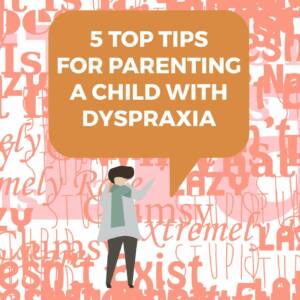
Parenting a child with dyspraxia can be a tough task, I’ve written 5 top tips for parenting a child with dyspraxia. We have to find ways to help our kids master the tasks that come naturally to others. Sometimes that can be with extra time and teaching and other times it by using some great hacks!
Here are my 5 Top Tips For Parenting A Child With Dyspraxia!
People with dyspraxia can struggle with organisational skills, but with the right help and support, they can be right on track with their peers. Visual timetables can be great for helping a dyspraxic child with organisation. From the morning routine to packing a school bag and making sure their homework is handed in on time. Visual timetables help!
We find toothbrushing to be a very difficult task due to the coordination required to brush teeth. Combine that with the sensory issues of the bristles and toothpaste and it can become a difficult task. I have 2 great tips for this! First, an electric toothbrush is really helpful as it takes away the need to coordinate toothbrushing. Second is a Finger Tooth Brush. The finger toothbrush is a silicone brush that fits on the end of your finger. It releases fluoride with each brush so regardless of which direction you’re brushing you know it’s working!
There are lots of fun ways to work on fine motor skills. In our house, we like to make everything as fun as possible. Jamie really struggles with using scissors so we roll up playdough and practice cutting it with scissors. It is much less intricate and quite a lot of fun … especially if you make the playdough yourself first! Folding paper is another great game, can you remember the paper fortune tellers we used to make as kids? Make some with your kids and then play with them afterwards. Both making them and playing with them are great for those fine motor skills.
You might be inclined to avoid things that your child finds difficult or struggles with. Things like going to the park can fill you with dread and fear. But going to the park can be a really good way to work those gross motor skills. There are lots of things to do in the park and it is lots of fun too. Take it slow and work with your child. Climbing the steps to the slide is a challenge but it will really help with coordination.
One of the most important things for any parent is to give their child praise. Praise is so important in Childs learning and it really helps to motivate them. Focus on your Childs achievements and give them praise specifically to the activity they have completed or the problem they have solved. That way they will know what they have done to please you and will seek to do it again. Every now and then it is nice to reward them too. A reward chart can sometimes work well here but it is important to make the goal achievable. If it isn’t achievable it won’t work.
As frustrating as it can be at times, children don’t do things wrong on purpose. It is important to remember that every day is different. Anxiety, stress and lack of sleep can all affect the way your child copes on a daily basis. This isn’t a race, take your time and help and support them as much as you can. Watch your child blossom and grow like I have done with mine.
We hope that these 5 top tips for parenting a child with dyspraxia have helped you. If you want to see our whole Dyspraxia collection check here:
https://blog.chewigem.com/discovering-dyspraxia-5-blogs-to-help-you-spread-dyspraxia-awareness/
If you need more support, why not consider joining your Facebook Sensory Support Group
Sensory Matters Podcast
Free Sensory Support Community
Can Chewigems Help Keep Your Teeth Clean?